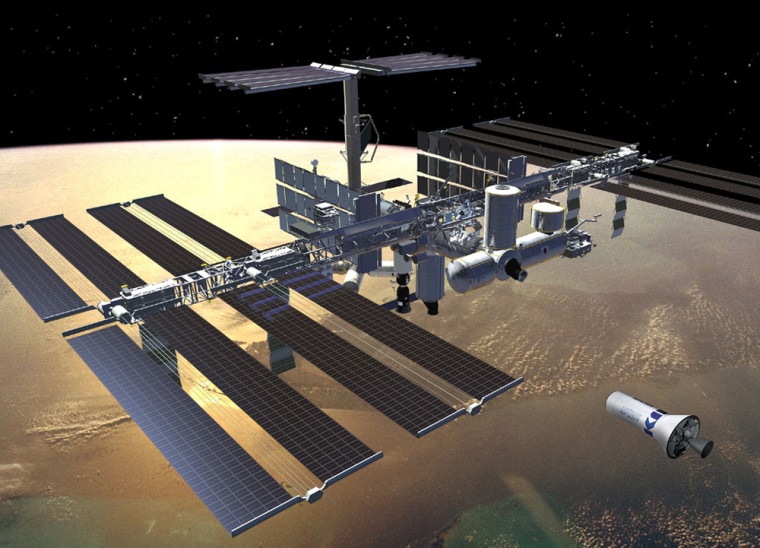In an exercise reminiscent of the "American Idol" TV show, NASA on Tuesday told several companies they are going on to the next round of negotiations in a $500 million program to commercialize transport to the international space station.
On "American Idol," the best contestants are told they're going to Hollywood for a prime-time sing-off. In this contest — known more prosaically as the Commercial Orbital Transportation Services program — NASA will give a more detailed hearing to the finalists' plans to send cargo or astronaut crews from Earth to the space station.
The space agency is planning to announce the winner or winners late this summer, said James Bailey, NASA's contracting officer for the COTS program. "We've selected several companies to have discussions with," Bailey told MSNBC.com. "We've been very pleased with the quality of the proposals we've received."
Bailey declined to say anything more about the next round of discussions, citing concerns about proprietary information. He even declined to define the word "several."
However, three companies acknowledged that they were finalists:
- Texas-based Spacehab, which built research modules for the space shuttle and is offering its Apex line of spacecraft.
- Oklahoma-based Rocketplane Kistler, which would adapt the Kistler K-1 reusable launch vehicle.
- California-based Space Exploration Technologies, or SpaceX, which is developing its Falcon 9 rocket as well its Dragon capsule for cargo and crew.
Other sources, speaking on condition of anonymity because of the official NASA reticence, said three more companies were on the list:
- The Virginia-based t/Space consortium, which is working on a Crew Transfer Vehicle, or CXV. The consortium includes AirLaunch, Constellation Services International, Orion Propulsion, Carnegie Mellon University's Robotics Institute and RedZone Robotics, Universal Space Lines — and Scaled Composites, which built the SpaceShipOne rocket plane.
- California-based SpaceDev, which worked on SpaceShipOne's hybrid rocket engine and is now proposing its Dream Chaser mini-shuttle concept.
- Andrews Space of Seattle, which already has received an Air Force contract to flesh out its Hybrid Launch Vehicle concept.
The COTS program has been largely shrouded in secrecy to this point, due to its entrepreneurial nature. It was set up as a backstop for resupplying the space station — particularly in the period between 2010, when the space shuttle fleet is due to be phased out, and the 2011-2014 time frame, when NASA's Crew Exploration Vehicle, or CEV, is to enter service.
Two teams led by heavyweights of the aerospace industry — Lockheed Martin on one side, and Northrop Grumman and the Boeing Co. on the other — are competing to win the CEV contract, with the winning team to be selected this fall.
In contrast with the multibillion-dollar CEV contract, the COTS program offers $500 million over five years. That's less than the cost of one shuttle flight, but the money is a powerful inducement for smaller aerospace companies. Early this year, more than 20 companies submitted proposals in hopes of getting to the finalist stage — including established firms such as Spacehab and Orbital Sciences as well as upstarts such as SpaceX, Rocketplane Kistler and t/Space.
Not all show their hands
Even after the calls went out on Tuesday, not all the competitors were willing to show their hands immediately. "We were notified that we will be participating in further negotiations ... To me, it's so far, so good," David Urie, executive vice president of Rocketplane Kistler, told MSNBC.com. He declined further comment, however.
SpaceX's founder and chief executive officer, Elon Musk, said his company was also a finalist. It was his understanding that the final selection would be made in August.
Spacehab initially declined to confirm a report on the "Dispatches From the Final Frontier" Web log that it was a finalist along with the five others — but on Wednesday it provided confirmation as well as further details.
“We are elated that NASA appreciates our technical solution and business approach for developing an achievable and sustainable commercial space services program,” Michael Kearney, Spacehab's president and chief executive officer, said in a company statement.
Representatives of t/Space, SpaceDev and Andrews Space declined to provide comments about their status, even though sources specifically cited them as finalists.
The finalists have teamed up with other companies to pursue their proposals, sometimes incestuously. For example, Canada's MacDonald Dettwiler and Associates, which built the robotic arms for the shuttle fleet and the space station, has signed on with SpaceX as well as Spacehab. Indeed, Spacehab has been listed as one of SpaceX's partners.
Other COTS applicants declined to say whether they were in or out. Chirinjeev Kathuria, chairman of the Canadian-American PlanetSpace venture, said he would hold off on commenting "until NASA makes the official announcement."
Taking the bad news
Some applicants confirmed that they were out of the running. George William Herbert of California-based Venturer Aerospace, for example, told MSNBC.com on Wednesday that he had just gotten the bad news from NASA's Bailey. Herbert said the company would continue with small-scale tests on Venturer capsule mockups.
"Obviously, we're still looking for funding sources," he said.
One of the most forthcoming applicants was Jim Akkerman, president of Texas-based Advent Launch Services. When initially contacted by telephone on Tuesday, Akkerman told MSNBC.com that he had heard "not a word" from NASA.
"I think that's good news. ... We haven't been rejected yet," he said. Akkerman explained that his rocket engine was due to undergo testing at NASA's Stennis Space Center sometime in the next few weeks.
Unfortunately, after Akkerman hung up the first time, he got a call from a representative at NASA's Johnson Space Center — and relayed the bad news to MSNBC.com a few minutes later.
"We've been turned down on the COTS thing," he said. "Talked with the guy a little bit, mentioned the engine tests we've got going on over at Stennis, and that we'd sure like to get involved with them one way or another, even if it's later on. And he indicated that's a possibility."
